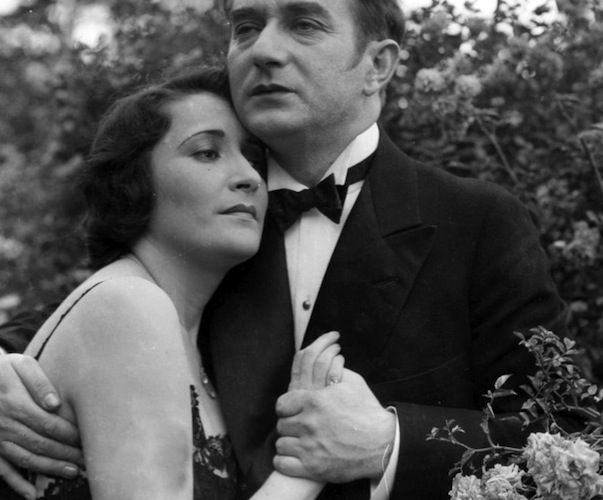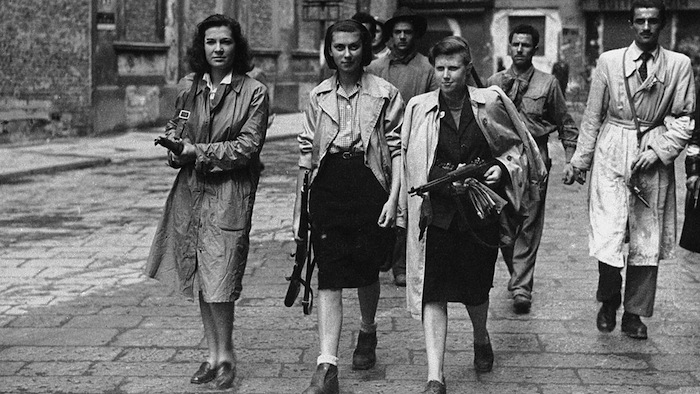Fuse Film Reviews: At Jewishfilm.2015 — History’s Revelations
The 18th Annual Jewish Film Festival approaches its end with two compelling cinematic looks at Jewish history.

A scene from 1931’s “His Wife’s Lover.”
By Paul Dervis
The National Center for Jewish Film’s 18th Annual Jewish Film Festival gallops into its home stretch this year with two very different films, the documentary My Italian Secret: The Forgotten Heroes (screening May 13 at the Museum of Fine Arts, Boston), and a restored version of the 1931 Yiddish film His Wife’s Lover (screening May 10 at West Newton Cinema).
Let’s start with His Wife’s Lover.
As a film, it isn’t much. The plot line is unimaginative and the acting, in general, borders on the amateurish. Even in its restored state, the print is grainy and there are several breaks in the sound. The movie may be over eighty years old and made in a very different social climate, but even from that perspective the storyline smacks of misogyny. And it’s take on striking workers is hardly enlightened. From an entertainment viewpoint (and His Wife’s Lover was billed as a musical comedy), it barely holds up today.
But what His Wife’s Lover offers from an historical perspective is something else all together.
It is fascinating.
The Yiddish theatre in New York, long considered one of the guiding lights of the Jewish ethnic community in the city, was at its apex when this film was made.(Its heyday ran from the turn-of-the-century to World War II.) Israil Bercovici, a Jewish Romanian dramaturg, playwright, director, biographer, and memoirist succinctly expressed the importance of this art form when he said that through this medium “Jewish culture entered in dialogue with the outside world”
But easily the most riveting aspect of this film is the gift it gave to Jerry Lewis. In His Wife’s Lover, Edouard Wien (played by Ludwig Satz) is a heartthrob of the Yiddish Theatre. His uncle, a producer, insists that all women are nothing but cheating gold diggers. They make a bet: Can Edouard, dressed up as a decrepit old millionaire, seduce a young woman, Golde, into marrying him for his loot?
When Edouard portrays the old man he takes on the voice, the cadence, and the mannerisms of Jerry Lewis’s familiar comic clown to the last detail. It is obvious that Lewis saw this characterization and that he owes a great debt to both Satz and the Yiddish theatre.

Footage from “My Italian Secret: The Forgotten Heroes.”
Now for My Italian Secret.
Oren Jacoby’s documentary is an in-depth examination of the plight of the Jews in Occupied Italy during the Second World War and the enormous risks taken by thousands of Italians to hide them from the SS. The film focuses extensively on Tour de France winner Gino Bartali, a national hero who risked his life in order to shield entire families; he also made use of his bicycle training to secretly pass messages throughout Italy. There are interviews with the living recipients of the Italian largess — children then but elderly now — and their quest to find their “heroes” today. The result is an eloquent and moving narrative that contains much captivating footage of the era. We learn that 1700 Jews were rounded up in Rome and eventually sent to the concentration camps to die; but that 10,000 escaped the death trains, rescued with the help of very ordinary citizens, including doormen and shopkeepers. Also crucial: the actions of Catholic churches and monasteries. One doctor created an entire wing at a hospital (called the K Ward) that was dedicated to a fictitious disease. Here a hundred Jews were being ‘treated’ for what was billed as a contagious, incurable ailment.
Isabella Rossellini narrates the piece with an even, almost passionless voice, a reserve that adds strength to each word. Robert Loggia reads passages from Bartali’s writings to fill in some of the blanks. And the elderly survivors do the rest.
The only weaknesses in My Italian Secret are the contemporary ‘reenactments”…they are completely unnecessary, adding an element of hokum to what is otherwise a piercing exploration of humanity acting with grace under lethal pressure.
Paul Dervis has been teaching drama in Canada at Algonquin College as well as the theatre conservatory Ottawa School of Speech & Drama for the past 15 years. Previously he ran theatre companies in Boston, New York, and Montreal. He has directed over 150 stage productions, receiving two dozen awards for his work. Paul has also directed six films, the most recent being 2011’s The Righteous Tithe.
